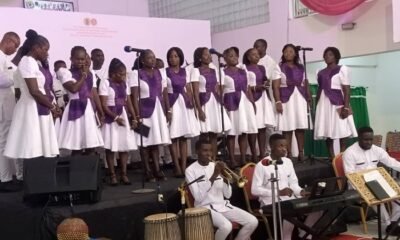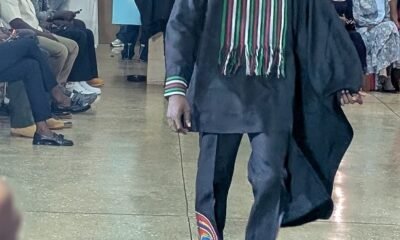News
Consume Made-in-Ghana chocolates — Madam Abla Dzifa Gomashie
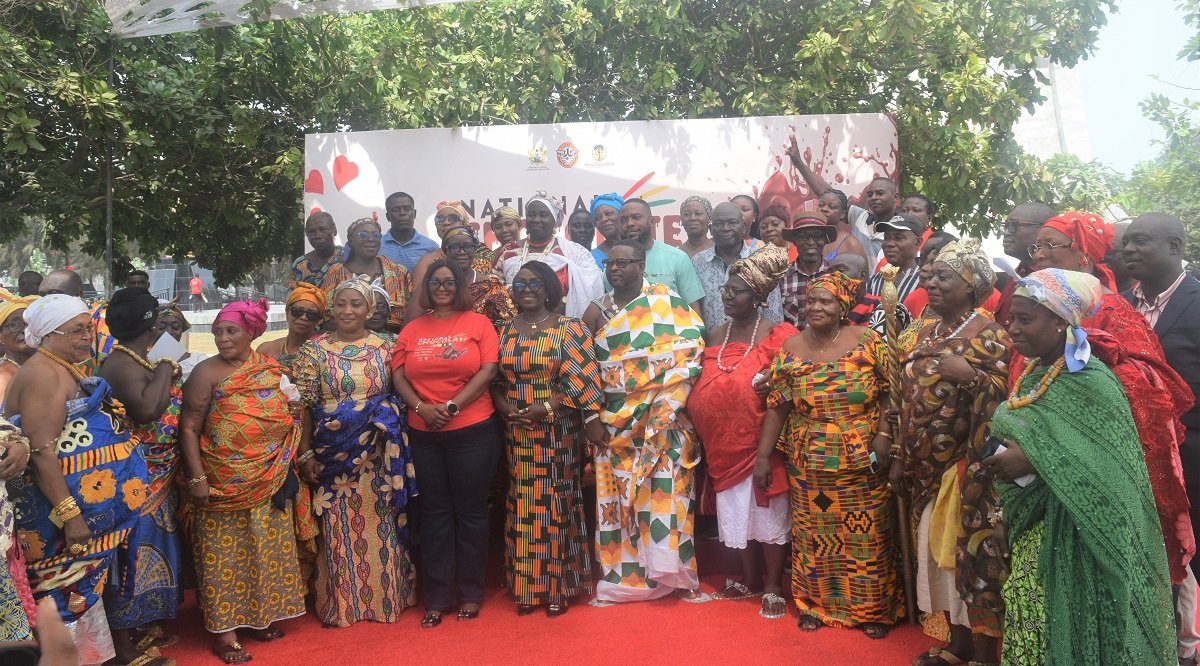
The Minister of Tourism, Culture and Creative Arts, Madam Abla Dzifa Gomashie, has urged Ghanaians to consume Made-in- Ghana chocolates to benefit from its rich nutrients, including antioxidants that boost the immune system.
She said this at the climax of this year’s National Chocolate Week celebration, organised by the Ghana Tourism Authority (GTA), the Cocoa Board and the Cocoa Processing Company on Friday, in Accra.
The celebration was on the theme ‘Eat Chocolate, Stay Healthy, Grow Ghana,’ with the sub-theme: ‘Chocolate for All: Taste, Share, and Care.’
The week-long celebration, coincided with the Valentine’s Day which is marked on February 14.
It was used to project the rich history and cultural significance of Ghana’s cocoa, and to remind Ghanaians of the importance of love, affection, and the joy of sharing chocolate with others.
“Chocolate is indeed a universal language that brings people together, and we are proud to be one of the world’s leading producers. By the celebration, we are not only promoting our local chocolate industry but also showcasing the best of Ghanaian culture and hospitality,” Madam Gomashie said.
The occasion was also to pay glowing tribute to Tetteh Quashie for introducing cocoa beans to Ghana from Fernando Po in the late 19th century, and to honour farmers who cultivate the prestigious crop, which was transformed into the sweet delight that brings joy to millions worldwide.
The Minister urged Ghanaians to taste, share, and care for local chocolates and continue to promote them, support cocoa farmers, and preserve Ghana’s cultural heritage.
She reiterated government’s commitment to providing resources, training, and market access to help Ghana’s chocolate industry to thrive.
The Chief Executive Officer, GTA, Mrs Maame Efua Houadjeto, said the theme epitomised the need to inculcate in the people the habit of consuming cocoa in its various forms.
By Jemima Esinam Kuatsinu
News
‘Stop shielding perpetratorsof Gender-Based Violence’By Spectator Reporter
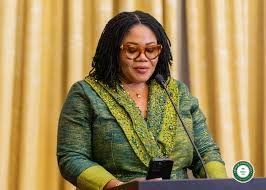
THE Minister of Gender, Children and Social Protection (MOGCSP), Dr Agnes Naa Momo Lartey, has called on traditional authorities, religious leaders and community influencers to stop shielding perpetrators of gender-based violence and allow the law to work.
She said too many cases were being buried at the community level, with abusers protected while victims were pressured into silence. This, she stressed, must end.
Dr Lartey made the call on Tuesday at the national launch of the 2025, 16 Days of Activism Against Gender-Based Violence campaign, held at the Kaneshie Main Station in Accra.
This year’s campaign, observed globally from November 25 to December 10, is on the theme: ‘Unite! End Digital Violence Against Women and Girls.’
It highlights rising incidents of cyberbullying, online stalking, image-based exploitation and other forms of technology-facilitated abuse that disproportionately affect women and girls.
The minister urged the media to use their platforms to condemn abuse and intensify education, noting that no person should “die in silence’’ in a society that values dignity, equality and the principles of Sustainable Development Goal 5.
She also encouraged women, girls, men and boys to report any form of abuse, assuring the public that support services were available to all, regardless of age or social status.
Dr Lartey described gender-based violence as one of the most pervasive human rights violations in Ghana. She referenced a 2016 Domestic Violence Survey showing that 27.7 per cent of Ghanaian women have experienced domestic violence, as well as a 2014 Demographic and Health Survey which revealed that 32 per cent of girls aged 15–24 believe wife beating was justified—an indication of harmful societal norms.
Calling the situation “unfortunate and sad,” she stressed that the nation must dismantle cultural beliefs that excuse or normalise violence.
Outlining government actions, Dr Lartey announced that Cabinet has approved the revised National Domestic Violence Policy, while the updated Domestic Abuse Bill and its Legislative Instrument were being finalised by the Attorney-General’s Department.
She also disclosed plans to operationalise a national shelter in Accra and begin constructing the 16 regional shelters promised to strengthen protection systems for survivors.
Additionally, the ministry has trained 200 market leaders as paralegals and 100 professionals, including psychologists, medical workers and legal experts, to support victims with referrals and counselling.
UNFPA Country Representative, Dr David Wilfred Ochan, reaffirmed the agency’s support for Ghana’s efforts. He unveiled a nationwide initiative titled “16 Stations, 16 Routes, 16 Destinations,” which will use the country’s public transport system to raise awareness on gender-based violence.
In partnership with the Ghana Private Road Transport Union (GPRTU), the initiative will promote stickers, public announcements, training and codes of conduct to ensure that transport stations become safe spaces where commuters, traders, porters and young people can access information and hotline services to report or prevent abuse.
Join our WhatsApp Channel now!
https://whatsapp.com/channel/0029VbBElzjInlqHhl1aTU27
News
Safeguard religious rights ofstudents – CRI urges studentsBy Spectator Reporter
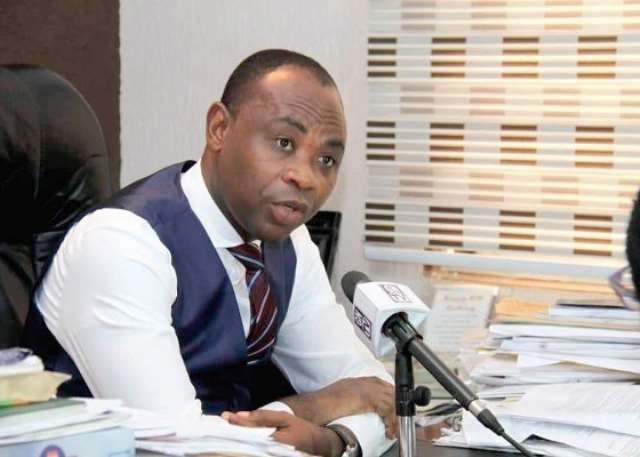
CHILD Rights International (CRI) is urging the government to adopt a firm and comprehensive national policy to safeguard the religious rights of students in secondary schools, insisting that no child should be denied education or the freedom to express their faith.
In a statement issued on Thursday in Accra, the organisation said the recent controversy involving Wesley Girls’ Senior High School highlights deep-seated gaps in how children’s rights were upheld within the country’s long-standing educational structures.
According to CRI, the incident underscores the need for Ghana to reassess the relationship between school traditions and the constitutional rights of students.
The group emphasised that the right to education and the right to religious expression were fundamental, and must be reflected consistently in rules and practices across all schools.
Additionally, CRI noted that many well-known mission institutions such as Holy Child School and St. Louis Senior High School operate on religious foundations that have shaped their administrative cultures for decades.
These differ significantly from state-established schools like Ghana Senior High School in Koforidua, Tamale Senior High School and Achimota Senior High School.
This contrast, CRI argued, raises an important national question and what policy framework has guided these mission schools since their incorporation into the public system?
Although the government has declared all such schools secular, they continue to function as government-assisted institutions, maintaining a hybrid structure that leaves them neither fully autonomous nor entirely under the Ghana Education Service (GES).
This unclear arrangement has led to inconsistent rules on discipline, conduct and religious expression from one school to another.
CRI warned that the absence of a unified and enforceable national policy leaves significant gaps in the protection of children’s rights.
While rights may be universal, the group emphasised that their protection depends on strong and clearly defined state regulations.
The organisation further stated that the State has yet to assume full regulatory authority over the schools it supports financially. As a result, key administrative and disciplinary decisions often remain at the discretion of individual school authorities, creating uneven standards nationwide.
For the rights of children, particularly their right to practise their religion to be fully realised, CRI believes the government must move toward full regulatory ownership of all schools it funds or classifies as public.
Without this, tensions between deeply rooted school traditions and constitutional freedoms are likely to persist.
The statement stressed that once a school admits a student, it takes responsibility not only for their academic development but also for respecting their identity, including their religious background. Therefore, no child, CRI insists, should be prevented from practicing their faith within the school environment.
Moreover, the organisation called for the establishment of clear national standards that guide schools on accommodating religious expression without compromising discipline or institutional order.
It also urged the government to strengthen safeguarding systems with firm oversight and routine monitoring to ensure that children’s rights are protected based on national law, not historical customs or administrative discretion.
CRI admonished the government to clarify the official status of government-assisted mission schools to ensure that the rights of all students are upheld consistently across the country.
By Spectator Reporter
Join our WhatsApp Channel now!
https://whatsapp.com/channel/0029VbBElzjInlqHhl1aTU27




